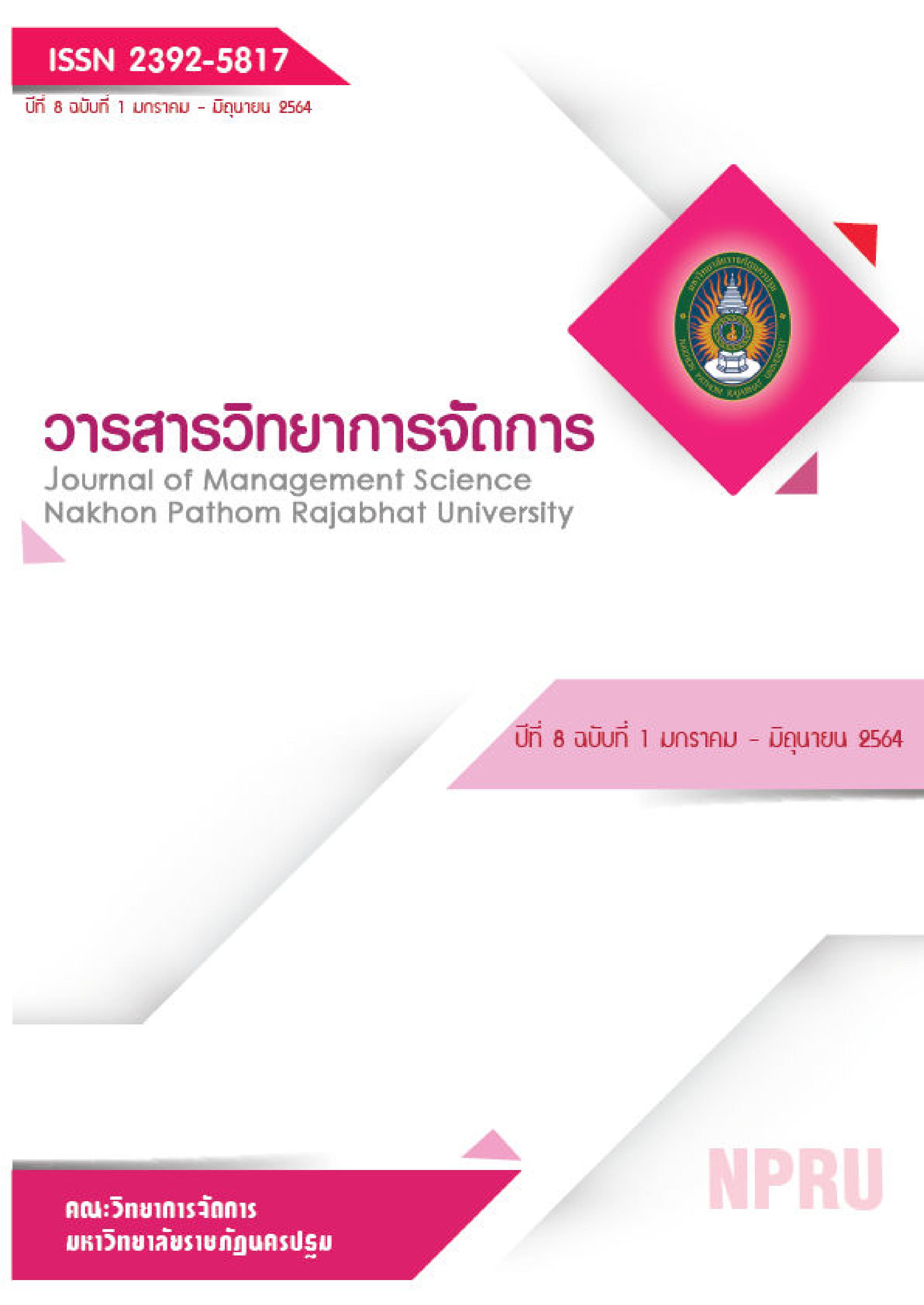A Personal Financial Management Guideline for Effective Retirement Plan of Employees of Rajabhat University
Main Article Content
Abstract
The purposes of this research are to study (1) the factor that influences the personal financial management for efficiency retirement plan of employees in Rajabhat University (2) to study the method of personal financial management and to provide the personal financial management and (3) guideline for efficiency retirement plan of employees in Rajabhat University. This research is mixed method research. The data collections are questionnaire and in-depth interview from employees in Rajabhat University. The statistics used in this research are descriptive statistics, linear regression analysis, and analysis the interview data by typological analysis.
The results indicated that the representative sample are realize about economic, being good financial discipline and behavior exempt debt, having skill and knowledge in finance for retirement, and being proper and appropriate financial attitude. 1. the model of saving and investment for retirement depends on income, monthly expenditure, other saving, living cost, and debt. 2. For the personal financial management methods of retirement planning, it was found that should have a plan for living in the future. They have to be driven by oneself in self-confidence and consciousness in spending and providing resources for retirement by managing income and expenses, personal debt management, personal risk management, and personal wealth management with the middle line. Besides, to be effective in money management for retirement, there is the enhancement of financial knowledge, financial health controlling and checking regularly. 3. the guidelines of effective retirement planning are to set goals for living after retirement in order to drive themselves in motivation to provide necessary resources after retirement. In the work life, they should provide sufficient income for expenditure and retirement saving or investment.
Article history: Received 25 June 2020
Revised 27 July 2020
Accepted 29 July 2020
SIMILARITY INDEX = 0.00 %
Article Details
The views and opinions of the article appearing in this journal are those of the author. It is not considered a view and responsibility of the editorial staff.
References
ตลาดหลักทรัพย์แห่งประเทศไทย. (2559). การบริหารการเงินส่วนบุคคล. (พิมพ์ครั้งที่ 4). กรุงเทพมหานคร. บริษัท บุญศิริการพิมพ์ จำกัด.
สมนึก เอื้อจิระพงษ์พันธ์ และปรรณ เก้าเอี้ยน. (2559). ปัจจัยที่มีผลต่อการจัดการการเงินส่วนบุคคลของข้าราชการตำรวจภูธรจังหวัดชุมพร. Journal of Management Sciences, 32 (2), 29-57.
สุขใจ น้ำผุด, อนุชนาฏ เจริญจิตรกรรม และ สมนึก วิวัฒนะ. (2557). กลยุทธ์การบริหารการเงินบุคคล. (พิมพ์ครั้งที่ 6). กรุงเทพมหานคร. สำนักพิมพ์มหาวิทยาลัยธรรมศาสตร์.
สนทยา เขมวิรัตน์ และดวงใจ เขมวิรัตน์. (2556) ปัจจัยที่ส่งผลต่อการจัดการการเงินส่วนบุคคลของบุคลากร กลุ่มมหาวิทยาลัยเทคโนโลยีราชมงคล ในเขตกรุงเทพมหานคร. กรุงเทพมหานคร: มหาวิทยาลัยเทคโนโลยีราชมงคลพระนคร.
สำนักงานคณะกรรมการกำกับหลักทรัพย์และตลาดหลักทรัพย์.(2553). การออมเพื่อการเกษียณ. [ออนไลน์]. ค้นเมื่อ 12 กันยายน 2559, จาก http://www.thaipvd.com/content_th.php?content_id=00037
Castro-González, K. C. (2014). Financial literacy and retirement planning: Evidence from Puerto Rico. Global Journal of Business Research, 8 (1), 87-98.
Ciumara, T. (2014). Factors Influencing Individual Financial Decisions: A Literature Review. GIDNI, At Targu Mures, 1, 420-427.
Duflo, Esther and Saez, Emmanuel. (2002). Participation and investment decisions in a retirement plan: the influence of colleagues’ choices. Journal of Public Economics: Elsevier, 85 (1), 121-148.
Elliott, W., Grinstein-Weiss, M., and Nam, I. (2013). Student debt and declining retirement savings (Working Paper No. 13-32). Retrieved May 1, 2019 from http/www. csd. wustl. edu/Publications/Documents/WP13-34. pdf.
Garman, E. T., Leech, I. E. and Grable, J. E. (1996). The Negative Impact of Employee Poor Personal Financial Behaviors on Employers. Financial Counseling and Planning, 7(1), 157-168.
Hanna, S. D., and Lindamood, S.(2010). Quantifying the Economic Benefits of Personal Financial Planning. Financial Services Review, 19(2), 111-127.
Hershey, D. A., Jacobs-Lawson, J. M., McArdle, J. J., and Hamagami, F. (2007). Psychological foundations of financial planning for retirement. Journal of Adult Development, 14 (1-2), 26-36.
Kapoor, J.R., Dlabay, L.R., Hughes, R.J., and Hart, M.M. (2017). Personal Finance. (12th ed.) New York: McGraw-Hill Education.
Kebede, M., and Kuar, J. (2015). Financial Literacy and Management of Personal Finance: A Review of Recent Literatures. Research Journal of Finance and Accounting, 6(13), 92-106.
Kiyosaki, R.T. (2014). Rich Dad’s Conspiracy of The Rich (The 8 rules of money). The United States of America: Plata Publishing.
Martin Jr, T. K., and Michael Finke PhD, C. F. P. (2014). A Comparison of Retirement Strategies and Financial Planner Value. Journal of Financial Planning, 27(11), 46-53.
Noone, J., Alpass, F., and Stephens, C. (2010). Do Men and Women Differ in Their Retirement Planning? Testing a Theoretical Model of Gendered Pathways to Retirement Preparation. Research on Aging, 32(6), 715–738.
Power, M.L., and Hira, T.K. (2004). University-Provided Retirement Planning Support and Retiree Financial Satisfaction During Retirement: Differences by Gender, Job Classification, and Planning Behavior. Risk Management and Insurance Review, 7(2), 121–149.
Stawski, R. S., Hershey, D. A., and Jacobs-Lawson, J. M. (2007). Goal Clarity and Financial Planning Activities as Determinants of Retirement Savings Contributions. The International Journal of Aging and Human Development, 64 (1), 13–32.
Turner, M. J., Bailey, W. C., and Scott, J. P. (1994). Factors Influencing Attitude Toward Retirement and Retirement Planning Among Midlife University Employees. Journal of Applied Gerontology, 13(2), 143–156.
Vyvyan, V., Blue, L., and Brimble, M. (2014). Factors that Influence Financial Capability and Effectiveness: Exploring Financial Counsellors Perspectives. Australasian Accounting, Business and Finance Journal, 8(4), 3-22.


